By Selma Al-Samarrai
A world-first occurred at St. Michael’s Hospital of Unity Health Toronto when Drs. Neil Fam, Mark Peterson and Géraldine Ong performed a catheter-based tricuspid valve replacement through the femoral vein in a patient’s leg.
The first patient to undergo this procedure, 76-year-old Mir Hasan Ali, says his health improved within 48 hours. One year later, his health remains markedly improved.
The team used the EVOQUE tricuspid valve replacement system. Prior to using the femoral approach, tricuspid valve replacement procedures were done through open heart surgery or a thoracotomy, meaning the incision occurred through the patient’s ribs. The surgery was effective but invasive, so it posed a greater risk of complications for older patients.
“Going through the femoral vein means the risk of complications is dramatically lower. Doing tricuspid valve replacements through the femoral approach is a game changer, as it opens up treatment options for patients with heart failure who are too sick to undergo surgery, or are not good candidates for tricuspid clipping,” explained Dr. Fam, an interventional cardiologist and the Director of Interventional Cardiology and Cardiac Catheterization Labs at St. Michael’s.
Prior to the procedure, which occurred on May 23, 2019, Ali explained that low-effort tasks such as getting out of the car or making the short walk from the bedroom to the bathroom proved too difficult. After the procedure, he could resume these tasks and many other daily activities with great ease.
“In April and May of last year, I was terrible. Taking just a few steps meant I had to sit down. I was always so drowsy, tired and irritable,” explained Ali.
“When Dr. Fam explained the procedure to me, my sixth sense said yes on the spot. I trusted completely that he could do it, and I was right.”
The St. Michael’s Structural Heart Team has since performed several more tricuspid valve replacement procedures using the femoral approach, with the patients reporting significant improvements in their health. To date, 25 patients worldwide have undergone the EVOQUE tricuspid valve replacement, and the results are very encouraging. With further studies planned.
The EVOQUE heart valve was first used for mitral valve replacements only. Just over two years ago, Dr. Fam approached the manufacturer Edwards to discuss if EVOQUE might be effective for tricuspid valve replacements as well, and this led to a great partnership to bring this idea to reality.
For the past five years, St. Michael’s has been a world leader in transcatheter tricuspid valve interventions, where tricuspid valves are repaired using MitraClip and PASCAL repair systems. However, some patients’ tricuspid valves were irreparable, and the challenge was to then develop a safe and effective procedure to entirely replace the tricuspid valve.
Ali says he is grateful to Dr. Fam and the Structural Heart Team at St. Michael’s for their excellent care and attention.
“Every single day, I pray for two people: one is my son, and the other is Dr. Neil Fam. He’s like family to me now,” said Ali.
“Fourteen months after the procedure and I’m still feeling great and trying my best to maintain my health. The pandemic was a challenge, my rehab was cancelled, but the procedure provided me the opportunity to live again, and I am taking all the precautions to maintain my healthy lifestyle.”
Selma Al-Samarrai works in communications at Unity Health.



